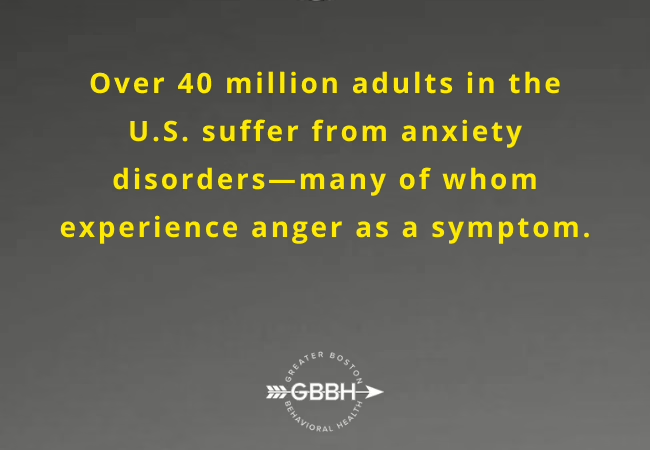Anger is a basic human emotion. When managed properly, it can help us protect boundaries, signal injustice, and motivate change. But when anger becomes persistent, disproportionate, or destructive, it can quickly erode relationships, health, and personal stability. For many people, anger is a symptom of deeper emotional challenges—stress, anxiety, trauma, or unmet emotional needs.
At Greater Boston Behavioral Health, we specialize in helping individuals understand and address the root causes of their anger through Anger Management Therapy in Boston. As part of our full continuum of Mental Health Programs in Boston, we offer targeted, evidence-based support that empowers clients to transform emotional volatility into emotional intelligence.
In this article, we’ll explore the warning signs that indicate it’s time to seek professional help, how anger therapy works, and which treatment options are available—from outpatient sessions to intensive residential care.
Anger Isn’t Always Obvious — But Its Impact Is
Anger doesn’t always look like yelling, throwing things, or violence. In fact, it often shows up as:
- Sarcasm or passive-aggressive behavior
- Internal tension and irritability
- Withdrawing from relationships
- Being hypercritical or judgmental
- Persistent frustration with yourself or others
Even if you don’t consider yourself to have “anger issues,” chronic irritability and emotional outbursts may be signs of an underlying problem—especially when they affect your quality of life.
Signs You Should Consider Anger Management Therapy
Here are some clear indicators that it may be time to seek help:
1. You Regularly Feel Like You’re “About to Snap”
If you feel like you’re walking around with a short fuse, constantly one minor irritation away from an explosion, your nervous system may be in a chronic state of activation—and you need tools to calm it down.
2. You Struggle to Communicate Without Becoming Aggressive or Defensive
Frequent yelling, blaming, or shutting down during conflict suggests emotional dysregulation that can be corrected through therapy.
3. You’ve Damaged Important Relationships
Unmanaged anger can strain or break even the closest bonds. If your temper has led to isolation, resentment, or loss of trust in your personal life, therapy can help rebuild those connections.
4. Anger Has Affected Your Work or Legal Standing
Have you been reprimanded at work? Suspended from school? Involved in a domestic dispute or legal case? These are critical red flags that call for immediate intervention.
5. You Feel Guilt or Shame After Angry Episodes
This emotional fallout is a sign that your behavior isn’t aligned with your values—and that you’re ready for change.
6. You’re Using Substances to Cope with Emotions
Alcohol, drugs, or compulsive behaviors (like overeating, gambling, or lashing out) are common coping mechanisms for anger and anxiety—but they make things worse. Anger therapy offers healthier alternatives.
7. You Have a History of Trauma or Mental Health Conditions
Anger is often a defense mechanism for deeper pain. If you’ve experienced trauma, abuse, neglect, or struggle with conditions like PTSD, depression, or anxiety, Anger Management Therapy can be a safe way to begin healing.
What Happens During Anger Management Therapy?
At Greater Boston Behavioral Health, anger management therapy is not about suppressing your emotions—it’s about understanding them, managing them, and expressing them constructively.
Our licensed clinicians use a combination of evidence-based modalities, including:
- Cognitive Behavioral Therapy (CBT): Identifying and reframing irrational thoughts that lead to anger.
- Dialectical Behavior Therapy (DBT): Teaching distress tolerance, emotional regulation, and mindfulness.
- Trauma-Informed Therapy: Addressing unresolved emotional wounds.
- Interpersonal Therapy: Improving communication and relationship skills.
- Mind-Body Approaches: Grounding exercises, breathwork, and mindfulness to calm the nervous system.
You’ll learn to:
- Identify your personal anger triggers
- Recognize early warning signs before you escalate
- Respond thoughtfully instead of reacting impulsively
- Communicate clearly and assertively
- Build self-awareness and emotional intelligence
What Treatment Options Are Available?
Because anger often coexists with other mental health issues, we offer a full spectrum of treatment options to meet each individual’s needs. Whether you’re struggling with mild emotional reactivity or intense behavioral outbursts, there’s a level of care that fits you:
Outpatient Therapy
Ideal for individuals with mild to moderate symptoms. You’ll meet with a licensed therapist weekly to explore your anger triggers, build self-awareness, and practice emotional regulation techniques.
Intensive Outpatient Program in Boston (IOP)
Designed for those needing more structure and support while still maintaining a work or school schedule. You’ll attend therapy 3–5 days a week and participate in group counseling, psychoeducation, and skills training.
Partial Hospitalization Program in Boston (PHP)
A more immersive, day-treatment model. PHP is best for individuals whose anger or emotional instability significantly interferes with daily functioning. Treatment includes:
- Daily group and individual therapy
- Medication management through our Psychiatric Care in Boston
- Mindfulness and holistic wellness training
Residential Treatment Program in Boston
Offers 24/7 care in a structured, live-in environment. This is ideal for individuals with complex emotional needs, trauma histories, or long-standing behavioral patterns that haven’t responded to outpatient therapy.
Inpatient Treatment Program in Boston
Recommended for individuals in acute emotional or behavioral crisis, including those at risk of harming themselves or others. This short-term intervention provides stabilization, medication support, and intensive therapy.
Psychiatric Care in Boston
Our integrated psychiatric services ensure that clients who need medication for mood stabilization, impulse control, anxiety, or depression receive expert evaluation and ongoing care as part of their treatment.
The Root Causes of Anger: More Than Just a “Temper”
Anger is rarely the problem—it’s often a symptom of deeper pain or unmet needs. Common root causes include:
- Unresolved trauma
- Chronic stress or burnout
- Repressed emotions (grief, fear, helplessness)
- Lack of emotional vocabulary
- Insecure attachment or abandonment wounds
- Poor coping skills learned in childhood
That’s why, at Greater Boston Behavioral Health, we approach anger as a doorway—not a dead end. We help you explore what’s beneath the surface so you can heal from the inside out.
The Long-Term Benefits of Anger Management Therapy
When you commit to healing your anger, the results extend far beyond better temper control. Clients often experience:
- Decreased anxiety and stress
- Improved self-control and confidence
- Stronger relationships and communication skills
- Better sleep and physical health
- Fewer regrets and more self-respect
- A deeper understanding of their emotions and triggers
You’ll go from reacting impulsively to responding intentionally. From losing control to being grounded. From damaging relationships to restoring them.
When to Reach Out for Help
You don’t have to wait for a crisis. If your anger is affecting your well-being, your peace of mind, or your relationships, now is the time to take action. At Greater Boston Behavioral Health, we’ll meet you with compassion, not judgment—and help you find a program that works for your unique needs. Whether you’re stepping into outpatient therapy or need the supportive structure of our Residential Treatment Program in Boston, we’ll walk with you every step of the way. Call us today at (888) 278-0716 to get started.
FAQ on Seek Anger Management Therapy
How do I know if my anger is “bad enough” to need therapy?
If anger is affecting your relationships, job, health, or peace of mind, it’s time to talk to a professional. You don’t need to wait for a crisis—early support leads to better outcomes.
Is anger management therapy only for people with legal issues?
Not at all. While some clients attend due to court mandates, most come because they want to improve communication, reduce emotional reactivity, and feel more in control.
Will I lose my temper less after therapy?
Yes. Anger management therapy helps you recognize triggers early, use calming techniques, and express yourself constructively—reducing both frequency and intensity of outbursts.
What if my anger is tied to trauma or anxiety?
Many people with unresolved trauma or anxiety experience anger as a symptom. Our Mental Health Programs in Boston include trauma-informed care and psychiatric support to address underlying causes.
slot gacor 4d
toto slot
toto slot
toto slot
togel slot
situs toto macau
agen slot gacor
bandar slot
togel slot
toto togel
daftar totoagung
game slot
toto slot login
toto togel
angka akurat
toto slot
toto slot 4d
pay4d
slot gacor 4d
toto slot
idn slot online
pay4d panel
toto online
slot gacor
slot anti kalah
amintoto
togel online terpercaya
slot gacor 4d
link gacor
slot qris
slot gacor 4d
login slot gacor
slot thailand
slot gacor 4d
bandar togel terpercaya
slot qris terbaru
sugar rush x1000
toto slot
situs toto
idn toto
togel slot
agen judi bola
bandar togel sgp
slot online
slot gacor
toto macau
toto macau
idn slot
toto macau 4d
slot qris
slot gacor 4d
slot gacor 4d
slot gampang menang
slot thailand
pay4d whitelabel


